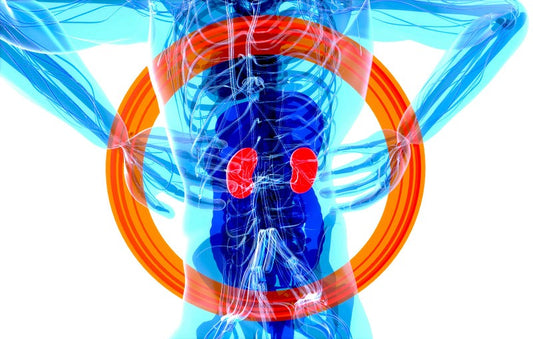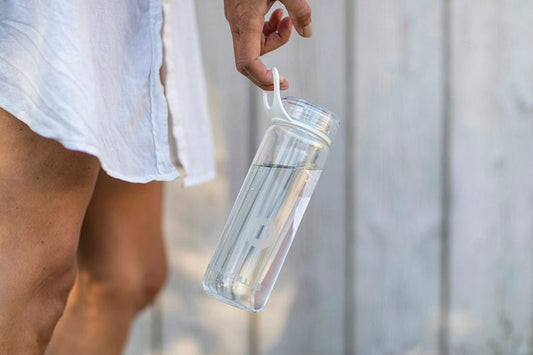The Influence of Hydration on Proper Functioning of the Urinary System
Water — the fundamental building block of life. While this may sound trivial, it is worth examining its role in the context of the health of our kidneys. After all, they play a crucial role in regulating the body’s water-electrolyte balance. So, how does water retention affect the health of our kidneys and what can we do to support their proper functioning?
 Photo by Maddi Bazzocco on Unsplash
Photo by Maddi Bazzocco on Unsplash
Hypertension and Kidney Health: Impact on Water Retention
Hypertension, often referred to as the silent killer, is a condition characterized by high blood pressure in the blood vessels. While we typically associate it with the heart and circulatory system, it’s important to note its impact on kidney health and water retention in the body.
-
Hypertension and Kidney
Health Our kidneys play a crucial role in regulating blood pressure by controlling blood volume as well as the levels of sodium and potassium in the body. In the case of hypertension, high blood pressure can lead to damage to the blood vessels in the kidneys, which in turn can result in chronic kidney disease. Chronic kidney disease can then cause water retention in the body by reducing the kidneys’ ability to remove excess water and salts.
-
Water Retention and Hypertension
Hypertension can also lead to water retention in the body, especially in extreme cases. High blood pressure can contribute to damage to blood vessels in various parts of the body, which can lead to fluid leakage from the blood vessels and swelling in the tissues, manifested as edema.
-
How to Prevent Water Retention Due to Hypertension?
Monitor Blood Pressure: Regular monitoring of blood pressure is crucial for detecting any problems at an early stage. People with hypertension should regularly check their blood pressure and pay attention to any changes.
-
Maintain a Balanced Diet: A diet rich in fruits, vegetables, whole grains, and healthy fats can help lower blood pressure. Limit salt, saturated fats, and sugars intake.
-
Exercise Regularly: Regular physical activity can help lower blood pressure and support kidney health by improving blood circulation and eliminating toxins from the body.
-
Avoid Tobacco Smoking and Excessive Alcohol Consumption: Tobacco smoking and excessive alcohol consumption can contribute to high blood pressure and increase the risk of blood vessel damage.
- Regular Medical Check-ups: Regular visits to the doctor will help monitor kidney health and early detection of any problems.
Hypertension can have a serious impact on kidney health and water retention in the body. Therefore, maintaining a healthy lifestyle, monitoring blood pressure, and regular check-ups are crucial for maintaining kidney health and preventing associated complications. Let us remember the importance of a healthy diet, physical activity, and avoiding harmful habits to keep our kidneys in the best condition possible.
 Photo by Mufid Majnun on Unsplash
Photo by Mufid Majnun on Unsplash
Dehydration and Kidney Health: How to Avoid Water Retention and Edema
1. The Role of Water for the Kidneys
Every day, our kidneys filter the blood, removing unnecessary metabolic byproducts and excess water that the body doesn’t need. Proper hydration enables the kidneys to function more effectively, allowing them to eliminate toxins and metabolic waste. Inadequate hydration can hinder this function, leading to the buildup of toxins in the body and burdening our kidneys.
2. Water Retention and Kidney Function
When the body is inadequately hydrated, our kidneys may struggle to excrete excess salt and toxins. As a result, this can lead to water retention in the body, manifested as swelling, especially in the areas of the legs, hands, and face. Moreover, water retention can also increase the risk of kidney stones and other urinary tract disorders.
3. Supporting Kidney Health Through Hydration:
-
Drink an Adequate Amount of Water: It is recommended to consume at least 8 glasses of water per day. However, individual needs may vary depending on age, gender, physical activity, and other factors.
-
Avoid High-Sugar Drinks: Carbonated beverages and sweetened juices may contain a lot of sugar, which can lead to unfavourable water retention in the body.
-
Limit Sodium Intake: Excessive sodium in the diet can increase water retention. Limit the consumption of table salt and processed foods.
-
Consume Diuretic Foods: Some food items, such as watermelon, cucumber, celery, or lemons, can aid in the natural removal of excess water from the body
 Photo by Melissa Walker Horn on Unsplash
Photo by Melissa Walker Horn on Unsplash
Summary
Proper hydration is crucial for the health of our kidneys. Ensuring that the body is adequately hydrated can help prevent water retention and support the proper functioning of the urinary system. Therefore, let us remember to regularly drink water and avoid excessive consumption of salt and sugar to maintain our kidneys in good condition. Taking care of kidney health is a key element of overall well-being.
''Let us therefore remember hydration as one of the pillars of a healthy lifestyle!''
AnaskoMed, Your Dietitian & Nutritionist




